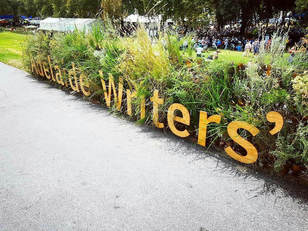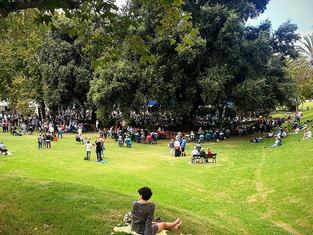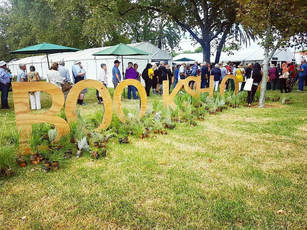|
6/3/2018 0 Comments Adelaide Writers' Week 2018 On 4 March 2018, I attended the Adelaide Writers’ Week. I always get excited when I hear about the authors that will be coming and talking about their work. I remember last year listening to Paula Byrne speak about her Jane Austen biography and how it was inspired by significant objects in Austen’s life. Hearing that side of Austen’s story and Paula’s love for writing about people’s lives was absolutely astounding. Unfortunately, I was only able to attend one panel last year. This year, I was able to fit in two, although I wish it could have been more! The first was called Kinds of Madness and had the authors Alexander Maksik and Samanta Schweblin on the panel, which looked into writing novels about mental illness and how they approached the complexities of it. Then straight after that panel I listened to Rebekah Clarkson, Sofie Laguna and Wendy Orr talk about the books that changed their lives. Both panels provided a magnificent insight into the life of an author and allowed there to be a personal connection between author and book, author and reader, and reader and book.  Before I go into the details of each panel, I want to write a little bit about the atmosphere I felt when I was there. To see lovers of writing and reading enjoying the company of one another while listening to fellow writers and readers speaking about their experiences felt reinvigorating. There’s something energising about being around people with similar interests and passions and knowing you’re not being judged for your interests. In other areas of life, it is seen as a social norm not to sit next to someone who you don’t know to avoid awkward contact with a stranger. It’s a shame in some respects since everyone has their own stories to tell and interesting things to say. Unfortunately, it is what it is and will probably continue to be for a long time (that is, in the culture that I am a part of). However, this was not the case at the writers’ week. It wasn’t seen as odd to sit next to someone who you didn’t know to listen to the speakers because everyone was there to do the same. There was a silent camaraderie that allowed people to sit comfortably and enjoy the event. It made people feel at ease to lean across and speak to the person sitting next to them and make a comment about what was said. People laughed together, wrote in silent groups or discussed the stories and authors they were interested in. It’s an unusual feeling being that comfortable with your passions around other people. I’ve felt it before at other events and I’m glad that they exist for a majority of interests so everyone gets to have that freedom. It would be a lovely world if we could live in happiness with no judgement regarding the things we love. I decided to watch Kinds of Madness because it sounded very interesting to listen to why Maksik and Schweblin wrote their books about mental illness and the notion of madness. They both provided short readings from their texts, which was absolutely brilliant to listen to. One thing that has stuck with me since that panel is Schweblin’s description on madness and sanity. Unfortunately, I can’t quote it word-from-word. However, it was about not thinking of madness and sanity as opposites. Everyone has their own sanity and their own madness. Sanity helps a person think through different aspects of their life and do what they do day-to-day. Madness helps a person do ‘the important stuff’. It encourages a person to take risks and to stand up for what they believe in. When I heard her say this, I felt the idea resonate within me. It made me feel empowered. Another part of that panel that took my interest was Maksik’s explanation of his book, in particular the idea of shame and class surrounding mental illness and the dangers of being undiagnosed. It’s interesting to be aware of something in society and not understand why you’ve grown up feeling a certain way about it. Hearing his description about the shame and class aspects of mental illness awoke a realisation within me. It was in reference to his book but it seemed entirely relevant to the world around us and our stereotypical views. It was also interesting to hear his concerns about people not being diagnosed when they need to be because of the risk they pose to themselves, which juxtaposes the popular feeling people have about the dangers of being diagnosed ie social segregation. All in all, I will definitely be grabbing their novels to read in the future!  Then came the second panel. Listening to Clarkson, Laguna and Orr talk about the books that had changed their lives was really interesting. It really provided an insight into who they are and how they see the world. It started off with them being asked what was the first book they read or the first book they bought. It was a very nostalgic conversation and being reminded of books like the Milly Molly Mandy stories brought a smile to my face. Then came the big question about what book changed their lives and why. Unfortunately, I had not heard of the texts they had mentioned. However, I will try and find them in future and give them a read. It was around this time that jets from the Adelaide 500 started flying over, which had the woman next to me making the remark about how lucky we were that we knew we were safe with those planes flying above. It had me thinking about the importance of perspective but also the dangers of the unknown. After her remark, I felt very unsettled because how did we know that we weren’t being attacked or we weren’t in danger? That’s a discussion for another day but definitely something to think about! There was a bit of a fun question around a certain president and what book the authors would recommend him reading, but the question that resulted in very interesting answers was what book the authors thought was the most influential in the world. They all conceded that religious texts such as The Bible and The Quran were probably the most influential. However, another answer that grabbed my attention was that the most influential book in the world is the one that hasn’t been written yet. The empty notebook sitting on a shelf waiting to be filled. It is an interesting thought and one that I agree with. Yes, there are some amazingly influential texts that exist in the world but with all the social change we’re seeing it is within us to be able to produce texts that could be as powerful. It’s so amazing that over three hours I was able to hear such interesting things and feel as motivated as I did at the end of it. If you ever hear about an event, convention or forum that involves what you’re passionate about, I would recommend going to it if you can. It provides an opportunity to learn some amazing things. It is through these events that I feel the most confident about the path I have chosen. The fire for storytelling, reading and writing has been ignited in me for a long time and I would like to see that in all of you. It is events like this that act as the kindling, so give them a try if you can
0 Comments
Leave a Reply. |
AuthorCharlotte is a reading and writing lover who has completed a creative writing intensive course at the University of Oxford and is a current university student studying a double degree in journalism and creative writing. If you are curious to learn more, check out the 'About' page. Archives
January 2019
Categories |
 RSS Feed
RSS Feed